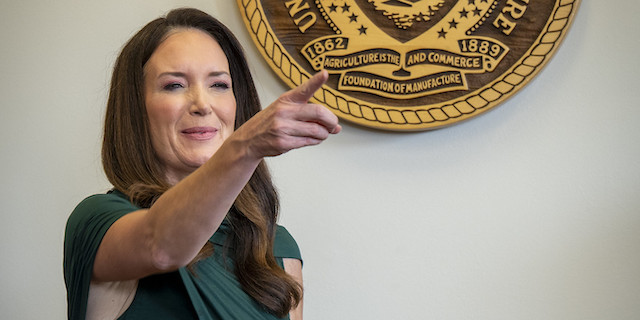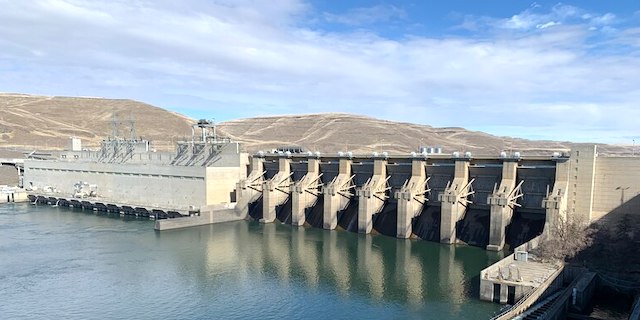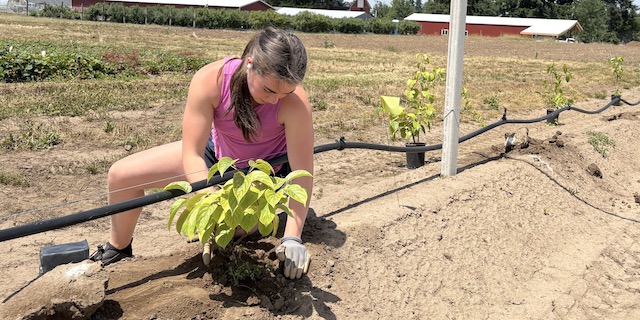A different kind of farming: Peace Corps stint leads to decades-long career in aquaculture
Published 7:00 am Thursday, October 29, 2020

- Gary Fornshell weighs fish at harvest in a cutthroat trout project in this 2018 photo.
TWIN FALLS, Idaho — Aquaculture has not just been a job for Gary Fornshell, a long-time extension educator with the University of Idaho. It’s been a passion — something that has garnered the admiration and respect of colleagues and fish farmers alike.
After nearly 28 years with the university as its first and only extension aquaculture educator, the fish aficionado retired his net in June — although he plans to do private consulting.
With 40 years total in aquaculture, Fornshell’s expertise is widely recognized in academic and industry circles. But folks might not know his first love was primates or that his path to the raceway was guided by happenstance.
After earning a degree in zoology from Colorado State University, Fornshell’s plan was to pursue a Ph.D. in animal behavior and study apes in Africa — like Jane Goodall.
“But I was tired of school, and prospects didn’t look good,” he said.
It was his senior year in college, and the Peace Corps was recruiting on campus. Curious about what that might hold, he was told he could teach science and math — or work in aquaculture.
“That’s the first time I heard the word aquaculture. I didn’t even know what it meant,” he said.
But a motorcycle came with the job, and that clinched the deal.
He spent two years in Africa, working with farmers building ponds and raising tilapia in what was then Zaire.
“It was like an epiphany to be able to see the results of efforts helping people putting food on the table. I fell in love with working with people and working with aquaculture,” he said.
He found his calling and didn’t have to look far to determine his next step. In the small community of Peace Corps volunteers throughout the world, those who wanted to pursue aquaculture went to Auburn University, which has a well-known national and international program.
After receiving a master’s degree in aquaculture, he was hired to manage the Aquaculture Research Unit at Mississippi State University in Starkville. He worked there from 1987 to 1992.
It was a great experience, he said, but he considered himself a westerner and wanted to get back out West.
Trout capital of the U.S.
Then he saw a job announcement from the University of Idaho seeking a multi-county extension agent in aquaculture. It was a change from warm-water fish in ponds to cold water fish in flow-through systems, but basic principles can be applied to all species and production systems, he said.
Still, it took a while to get acclimated.
“I spent most of my time with my mouth shut and ears open, and I read a lot,” he said.
But his work in Zaire and the Mississippi Delta had prepared him well. In both settings, he had gotten comfortable with farmers, established credibility and gained their trust.
“That right there is the heart of it all, to have their trust and be credible,” he said.
Before interviewing for the job in Idaho, he had learned the main concern in Idaho’s industry was water quality in the Middle Snake River and discharge from fish farms.
“And I worked in that area ‘til the day I retired,” he said.
Water quality is central to the industry, and all aspects of it are connected, from feed to waste management, he said.
“The University of Idaho did some groundbreaking research on dietary phosphorous requirements in rainbow trout,” he said.
It was aimed at formulating feed with less phosphorous but with more of it available to the fish, he said.
The industry has also switched to feeds that float or sink slowly that are high-energy and nutrient-dense. That’s had a significant impact on the feed-conversion ratio and the amount of solids and nutrients generated, leading to better fish performance and better water quality, he said.
“A lot of my career was spent, with one facet or another, with what I’d call ‘fish poop,’” he said.
The focus has always been on the concentration of total phosphorus in the Mid-Snake. The industry is always looking to improve the quality of discharge, and it’s improved considerably due to university and industry research, he said.
Over his career, Fornshell directed his research and studies to support fish farmers and improve water quality. He’s published an impressive number of scholarly papers, given innumerable presentations and seminars and consistently collaborated with the College of Southern Idaho’s aquaculture program. He’s also served in numerous leadership and advisory roles locally, nationally and internationally and has been recognized for his contributions.
His main focus, however, was sharing research with producers.
He worked one-on-one with farmers, helping them with best management plans and regulatory compliance and performed water quality sampling on their operations. He held workshops, demonstration projects and pilot trials and kept farmers up to date through newsletters and emails.
“I loved working with farmers; that’s what made the job. I consider myself quite fortunate,” he said.
Mutual appreciation
Idaho’s fish farmers say Fornshell has been invaluable to the state’s aquaculture industry, which produces about 41 million pounds of trout a year and about 70% of all domestic trout, employs 800 people and generates $150 million in production and processing revenue on 80 fish farms.
“Gary will be missed more by the industry than (it would miss) anything that’s happened to the industry in the last 50 years,” said Leo Ray, owner of Fish Processors of Idaho.
The focus of extension is to take research and convey it to farmers. The job is to be a communication link between research and the industry needing information and to disseminate that information, he said.
“And that’s what Gary did. Gary was the best in the nation,” he said.
And he has a network across the U.S. and can find the answer to any question farmers have, he said.
He taught farmers how to raise fish, what the potential is and provided resources, he said.
“Gary was excellent at it,” he said.
Not only did he keep farmers up to date on research, he also informed them about government issues that affect the industry. He was so dedicated that he notified fish farmers about pandemic assistance even after he retired, he said.
“He was excellent, and we will miss him severely,” he said.
The university already misses him, said Lyle Hansen, director of the university’s extension central district.
“He’s very well respected, very impressive,” he said.
He is always mindful of the industry’s needs and linking fish farmers with the right resource, grants, best practices, publications and his network of people in aquaculture and academia, he said.
“He was always needs-based and doing what was needed for the industry. And he always found the time,” he said.
Hansen said he was impressed with how deep a program Fornshell ran. In addition to outreach, he was deeply involved in research and published a multitude of scholarly papers so others could benefit. And he kept up with all the latest research, looking for opportunity for Idaho’s industry, he said.
His work in water quality was an asset that reached beyond the industry, he said.
On the university side, Fornshell had a willingness and selflessness to mentor, assist and serve to make sure Idahoans were getting what was needed in research, he said.
“I could always count on Gary if I needed someone to step up and serve,” he said.
Fornshell said University of Idaho Extension always supported him and his programs, and he’s glad he came across that job announcement so many years ago.
“It’s been a pleasure working for the University of Idaho. It allowed me to achieve a lot of personal and professional goals,” he said.
As the first aquaculture extension educator, Fornshell had a lot of freedom to focus on areas and develop an aquaculture program to address the needs of fish farmers, he said.
“It’s very rewarding and satisfying to see that what you do, people appreciate that and it helps,” he said.
Occupation: University of Idaho extension educator-aquaculture, retired
Education: Master’s degree in aquaculture, Auburn University, Auburn, Ala., 1986; bachelor’s degree in zoology, Colorado State University, Ft. Collins, Colo., 1980
Age: 62
Home: Twin Falls, Idaho
Honors: Numerous awards including the Clark and Mimi White Distinguished Service Award; U.S. Trout Farmers Association, 2019; and Distinguished Service Award, U.S. Aquaculture Association, 2020
Affiliations: World Aquaculture Society, past board member; U.S. Aquaculture Society, past president; U.S. Trout Farmers Association, board adviser; National Aquaculture Association; Idaho Aquaculture Association, ex-officio; Washington Fish Growers Association; National Association of Agricultural Agents; and Epsilon Sigma Phi.
Family: Wife, Rosemary; grown son and stepdaughter; two grandsons






